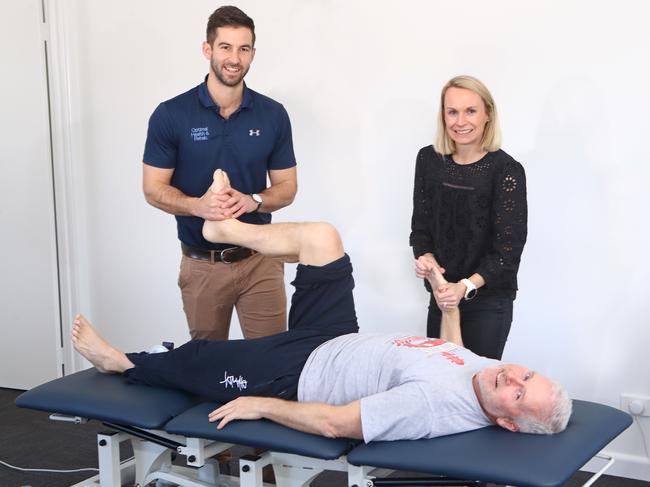Lorne’s Tony Harris reveals stroke discovery and path to recovery
Tony Harris woke up at his Lorne home one morning in early May with tingling down his right side and slightly slurred speech. After quickly recognising he was having a stroke he’s now on the road to recovering his motor skills.

Geelong
Don't miss out on the headlines from Geelong. Followed categories will be added to My News.
Tony Harris woke up at his Lorne home one morning in early May with tingling down his right side and slightly slurred speech.
“I said to my partner, ‘I think I might be having a stroke’,” the 63-year-old recalled.
Months later, Mr Harris is still undergoing multiple forms of therapy as he works towards returning to outdoor activities, such as running.
On the day of the stroke, Mr Harris was taken to Geelong hospital by ambulance.
He was in hospital for three nights before being transferred to the McKellar Centre, where he stayed for two months while undergoing rehabilitation and occupational therapy.
Following his discharge and during intensive rehab, he has stayed in Geelong and had treatment including occupational therapy, physiotherapy and laser therapy.
“It’s affected right down my right side — I’ve got limited range in arm and leg,” Mr Harris said.

“Most of the fine motor skills are being done with my pre-stroke, non-dominant left side.”
Before the stroke, Mr Harris said he had basic knowledge of stroke awareness, including the FAST acronym, which stands for Face, Arms, Speech and Time.
This week is National Stroke Week and the Stroke Foundation is celebrating FAST heroes around the country — the everyday Australians who know and can recognise the most common signs of stroke fast.
The acronym helps identify strokes and, in the instance of a suspected stroke, encourages people to check their face and whether the person’s mouth has drooped.
People should then see whether the person can lift both arms, whether their speech is slurred and whether the suspected stroke victim understands them.
And in a stroke situation, time is critical.
Anyone who identifies the signs should call 000 straight away.
“Awareness is important, particularly people understanding that simple acronym,” Mr Harris said.
“We never know when we’re going to get a stroke.”
Geelong & Surrounds Occupational Therapy co-owner Sara Coulter said recovering from a stroke could be “nearly a full-time job”.
“If you can get help quickly, it’s going to reduce the impact of the stroke,” she said.
MORE NEWS
LATEST GEELONG COVID-19 NUMBERS
DROOL-WORTHY BURGERS COMING TO GEELONG
PERVERT JAILED FOR DISGUSTING CRIMES
Originally published as Lorne’s Tony Harris reveals stroke discovery and path to recovery

